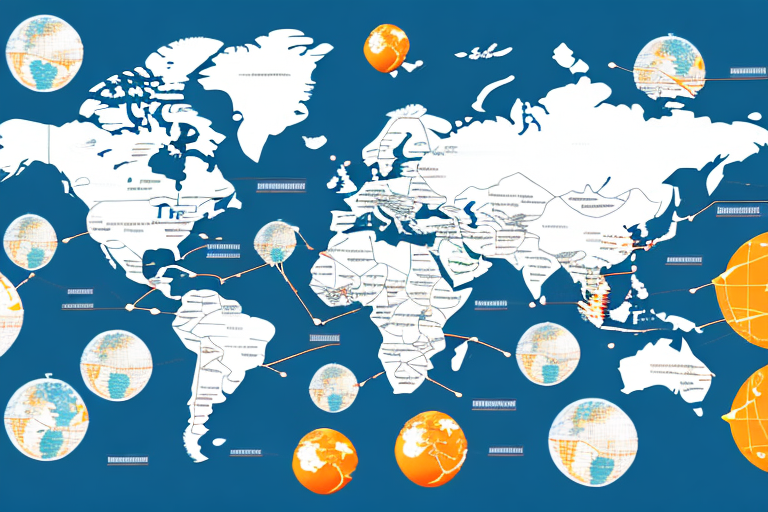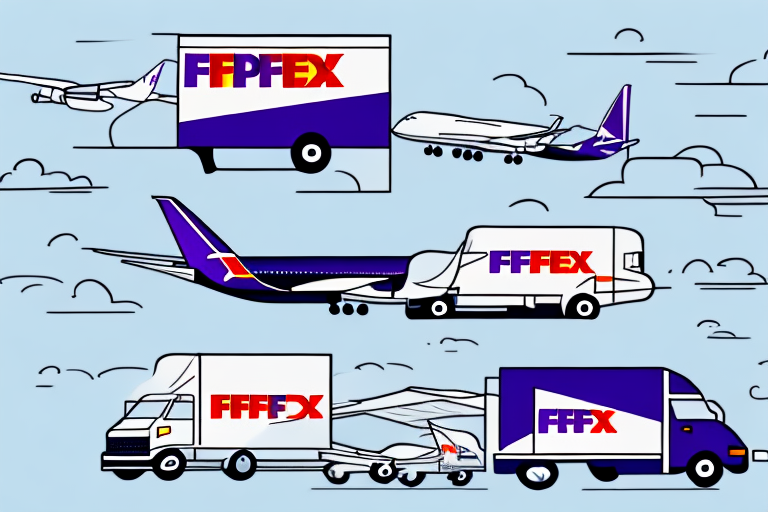Who Is UPS: An Overview of the Global Logistics Company
As one of the largest logistics companies in the world, UPS has been trusted by businesses and individuals alike for over a century. With a focus on efficiency and customer satisfaction, UPS has grown from a local delivery service to a global logistics powerhouse. In this article, we’ll explore the history of UPS, its values and mission, the services it offers, the role of technology and sustainability in its operations, its competition in the logistics industry, the work culture of UPS employees, and the company’s plans for the future.
History of UPS: From Humble Beginnings to Global Expansion
A Brief History of UPS: How It All Began
UPS was founded in 1907 by James E. Casey, who borrowed $100 to start a messenger service in Seattle, Washington, initially named the American Messenger Company. By 1913, the company had expanded to Oakland, California, and changed its name to United Parcel Service. This marked the beginning of UPS offering air delivery services. Throughout the following decades, UPS expanded its delivery network across the United States, establishing itself as a reliable and efficient courier service. Today, UPS delivers over 21 million packages and documents every day to more than 220 countries and territories worldwide.
Challenges and Innovations in the 20th Century
In the 1970s, UPS faced significant competition when the United States Postal Service began offering overnight delivery services. In response, UPS launched its own overnight delivery service, known as UPS Next Day Air, which allowed the company to compete effectively with the Postal Service and other courier companies, solidifying its position as a leader in the industry.
Embracing Sustainability and Technological Advancements
In recent years, UPS has focused on sustainability and reducing its carbon footprint. The company has invested in alternative fuel vehicles, such as electric and hybrid trucks, and implemented more efficient delivery routes to reduce emissions. UPS has set a goal to source 25% of its electricity from renewable energy sources by 2025 (UPS Sustainability Initiatives).
UPS Mission and Values: Commitment to Excellence and Innovation
At the core of UPS’s success is its mission statement, emphasizing excellence, teamwork, customer service, integrity, and a strong work ethic. These values are reflected in the company’s daily operations and interactions with customers and employees alike.
- Excellence: Striving for the highest quality in service delivery.
- Teamwork: Collaborating effectively across all levels of the organization.
- Customer Service: Focusing on meeting and exceeding customer expectations.
- Integrity: Upholding ethical standards in all business practices.
- Innovation: Continuously exploring new technologies and solutions.
Sustainability as a Core Value
One of the key values UPS emphasizes is sustainability. The company is committed to reducing its carbon footprint and implementing environmentally-friendly practices across its operations. This includes investing in alternative fuel vehicles, optimizing delivery routes to reduce emissions, and using eco-friendly packaging materials.
Fostering Innovation at UPS
UPS is constantly exploring new technologies to improve its services and meet evolving customer needs. This includes developing new delivery methods such as drone and autonomous vehicle deliveries, and investing in advanced analytics and data management tools to optimize operations.
UPS Services and Solutions: Comprehensive Logistics Offerings
UPS offers a wide range of logistics solutions to businesses and individuals globally, including package and freight delivery, transportation and logistics, international trade management, and supply chain solutions. Whether shipping a package across town or across the globe, UPS provides expertise and resources for efficient and reliable delivery.
Core Services
- Package Delivery: Fast and reliable delivery options for packages of all sizes.
- Freight Services: Air, ocean, and ground freight services for larger shipments.
- Supply Chain Management: Comprehensive solutions to manage the supply chain effectively.
- International Trade Management: Facilitating global trade with customs brokerage and compliance.
- E-commerce Solutions: Supporting online retailers with shipping and logistics services.
Industry-Specific Solutions
UPS provides specialized solutions for various industries, including:
- Healthcare: Temperature-controlled shipping for sensitive medical supplies.
- Automotive: Just-in-time delivery for automotive parts.
- Aerospace: Specialized packaging and handling for aerospace components.
Technology and Innovation in UPS Operations
Advanced Tracking and Logistics Software
UPS utilizes advanced tracking systems and logistics software to ensure packages are delivered on time and in excellent condition. Their online tools allow customers to track shipments and manage logistics needs from anywhere in the world.
Innovative Delivery Technologies
- Drones: Testing drone deliveries in rural areas to save time and reduce truck usage.
- Electric Vehicles: Replacing traditional delivery trucks with electric vehicles to lower emissions.
These technologies not only enhance efficiency and customer satisfaction but also contribute to a more sustainable future (Forbes on Logistics Innovation).
Sustainability at UPS: A Commitment to Environmental Responsibility
Green Fleet Program
UPS’s Green Fleet Program involves using alternative fuel vehicles, such as electric, hybrid, and natural gas-powered trucks and vans. These vehicles emit significantly fewer greenhouse gases compared to traditional diesel vehicles.
Renewable Energy Investments
UPS has invested in renewable energy sources, including solar and wind power, to power its facilities and reduce reliance on fossil fuels. These initiatives have resulted in substantial cost savings and reduced environmental impact (Renewable Energy World on UPS).
Collaborative Sustainability Efforts
UPS actively works with supply chain partners to promote sustainable business practices, ensuring that sustainability is integrated throughout its operations.
Competitive Landscape: UPS vs. Other Logistics Giants
UPS is a global leader in logistics, but it faces strong competition from companies like FedEx, DHL, and Amazon. Each competitor has its strengths, but UPS distinguishes itself through reliability, efficiency, and exceptional customer service.
Sustainability as a Competitive Advantage
UPS differentiates itself with robust sustainability efforts, including investments in alternative fuel vehicles and renewable energy. By aiming to source 25% of its electricity from renewable sources by 2025, UPS attracts customers who prioritize environmentally responsible companies.
Innovative Logistics Solutions
UPS’s continuous innovation in logistics solutions, such as drone deliveries and electric vehicles, keeps it ahead in the competitive market.
Work Culture at UPS: Empowering Employees for Success
A Day in the Life of a UPS Employee
UPS employees are known for their hard work, dedication, and attention to detail. The company fosters a supportive and rewarding work environment, offering a range of training and development opportunities to help employees grow professionally.
Commitment to Sustainability Among Employees
Employees at UPS take pride in the company’s sustainability initiatives, such as using alternative fuel vehicles and optimizing delivery routes to minimize fuel consumption. This commitment to environmental responsibility enhances employee satisfaction and engagement.
Future of Logistics with UPS: Trends and Innovations to Watch
Embracing Emerging Technologies
UPS is leveraging emerging technologies like artificial intelligence (AI), blockchain, and the Internet of Things (IoT) to enhance efficiency and customer service. These technologies enable UPS to optimize operations and provide better tracking and delivery solutions.
Expanding into New Markets
UPS is exploring new opportunities in e-commerce, healthcare logistics, and other sectors to meet the changing demands of the marketplace. By diversifying its services, UPS aims to stay ahead of industry trends and maintain its leadership position.
Sustainability Goals for the Future
UPS has set ambitious goals to reduce its carbon footprint, including achieving carbon neutrality across its global operations by 2050. The company is investing in renewable energy and alternative fuel vehicles to support these sustainability objectives.



















